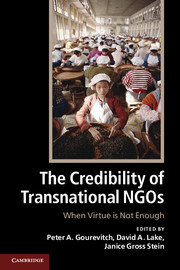4 - Becoming a household name
how human rights NGOs establish credibility through organizational structure
from Part I - Monitoring and NGOs
Published online by Cambridge University Press: 05 June 2012
Summary
Why should we believe the word of non-governmental organizations (NGOs) working on human rights? They are, after all, actors with interests and values, pursuing political agendas. Contrary to what some have argued, their positions are not apolitical (Wilson 1997; Winston 2001); they do not adopt views in an idealistic vacuum. While human rights NGOs can be considered virtuous because the nature of their work is characterized as “good” by most, like other NGOs and other political actors, NGOs also have distinct agendas. They make tradeoffs on the issues and cases they choose to advocate. Knowing this, under what conditions should we believe human rights NGOs? Should we always find them credible because they do good work protecting people from oppressive regimes, exposing violations of international law? Should we accept their monitoring as credible because they tend to be accurate? As it will become clear below, the “we” (i.e. the audience) that evaluates NGOs actually matters quite a bit. Knowing that credibility is in the eye of the beholder, human rights NGOs also attempt to position themselves such that they are more credible to certain audiences. The credibility of two of the most important human rights NGOs, Amnesty International and Human Rights Watch (HRW), is achieved through different organizational structure choices, which I argue is one critical method by which audiences can evaluate NGO credibility.
Human rights NGOs often stress the accuracy of their reporting to demonstrate their trustworthiness as a strategy to establish or augment their credibility. First, human rights NGOs fundamentally have to be accurate – their accounts that states are abusing human rights need to be true, or else it undermines their ability to engage in transnational politics: information, symbolic, leverage, accountability (Keck and Sikkink 1998). However, accuracy of information is a function of the perception of NGOs as trustworthy organizations themselves. NGOs are taken seriously when their reports turn out to be true; they become credible as political actors and informants as they establish their reputations for accurately revealing abuses on individuals. Accuracy leads to credibility. However, the credibility of an actor can also lead to the perception of that actor’s words as accurate. In other words, at some point, the assumption that an actor is credible leads to the perception (real or not) that the information she shares is accurate. Accuracy can therefore be seen as part of a definition of credibility, but not its entirety.
- Type
- Chapter
- Information
- The Credibility of Transnational NGOsWhen Virtue is Not Enough, pp. 86 - 112Publisher: Cambridge University PressPrint publication year: 2012
- 4
- Cited by



